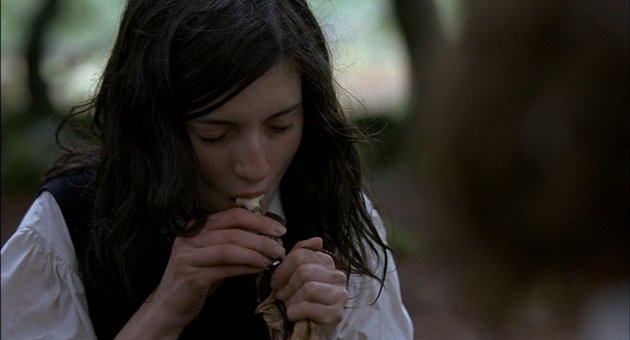[easyazon-image align=”left” asin=”B00CYI4KK2″ locale=”us” height=”160″ src=”http://ecx.images-amazon.com/images/I/51ilmi1oZsL._SL160_.jpg” width=”108″]The Story of Luke deals with a young man with autism, abandoned in infancy by his mother and raised by his grandparents. His grandmother, as his primary caregiver, had perhaps sheltered him more than she should have. Luke gets home schooled and/or takes distance learning classes for high school. He lacks vocational training or any sort of transition plan. When his grandmother dies, he is forced to move in with his Uncle Paul and Aunt Cindy, who have issues of their own (she’s on antidepressants, and he’s just a pill), and two younger (presumably) “normal” children. There are some scenes where “what to do about Luke” is discussed among others, and he overhears. Aunt Cindy has delicate sensibilities, and must have deep pockets as well, because she has the grandfather admitted to a nursing home following an incident where he attempts to grab her posterior, and offers her $20. At a rest stop on the way to the nursing home, Luke’s grandfather tells him that Luke is now a man and must live his own life, including getting a job and finding a woman who “is willing to travel and doesn’t nag too much”. At the rest stop, Luke meets a sympathetic convenience store clerk who gives him a pile of pornographic magazines when he asks about “screwing”. Luke’s final conversation with his grandfather has a strong impact on the boy, who decides, despite the challenges faced by his condition, to try to get a job and a girlfriend. These pursuits are made more challenging than they had to be by the fact that he lacks transportation, and his aunt is initially against him attempting to get a job. She comes around, when she realizes that enforced idleness and lacking the opportunity to acquire an adult role could be harmful and depressing to him as well.
Luke is not the “stereotypical autistic”. He speaks and responds to others, though stilted delivery and the repetition of common sayings act as an indicator that he does not have the spontaneity that others do, and the clearly-shown anxiety with every challenging situation he encounters hints at what lies beneath the polite well-groomed young man’s attempt at maintaining a socially-appropriate mien. He walks down the street covering his ears when loud sounds overwhelm him, and significantly sits in the seats reserved for the handicapped when he takes the bus. Some situations provoke a bit of mild “stimming”. Though he discloses some talent at preparing dishes he had seen made on cooking shows on TV, he denies any specialized or savant skills. When asked about his condition, though some call him “a retard” or say he has autism, he claims “my grandmother told me that I defy clinical categorization”.
The grandfather, who seems physically healthy other than an incident of incontinence and the revival of a smoking habit, dies conveniently the next time Luke is given the opportunity to visit the nursing home.
After he settles in with his aunt and uncle, Luke at first unsuccessfully pursues both work and love, signing up with a temp agency where he meets an older black woman “with nice tits”, who works as the receptionist, and is later the first woman he asks for a date. He finds out about a company that could help him, with a program called the Smile, which hires and trains people on the autistic spectrum for menial jobs within corporations. The owner, in fact, has an autistic son who works for him, Zack, supervisor of the new apprentices. Zack is bitter and abrasive, and feels a need to prove himself to his father. Luke is then hired as an apprentice and in spite of Zack yelling at him and being less than clear about some of his initial job responsibilities, he proves himself able to adapt. His resourcefulness and desire to ask out the girl at the temp agency hits Zack, who decides to try to help him, which has the result of helping himself at the same time.
Zack teaches Luke to carefully observe and mimic the body language and non-verbal interactions of “NTs”, or “neurotypical” people, and then shows him simulator software he developed which has on-screen virtual faces and personas responding in real time to Luke’s interactions with them. In spite of this unique training tool for human interaction, Luke still gets rejected when he asks the woman on a date. Zack ends up getting it used for customer service within the company, and hopefully, redeeming himself in his father’s eyes. Luke starts looking exceptionally personable and capable, and lands a long term job with the company.
In the meantime, Luke’s aunt, uncle, and cousins have been warming up to him, and discover the whereabouts of his mother. Zack helps groom Luke for the occasion and accompanies him when he decides to meet his mother. Luke discovers that his mother has another grown son and a family who doesn’t know about Luke, and she would prefer to keep it that way. Though Luke is disappointed that his reunion with his mother wasn’t a happy and loving one, by NT standards, he does get closure on why she acted as she did: “I didn’t think I would ever hear you talk to me” she said.
Cracks
 The students and teachers at the elite English girl’s boarding school in Cracks appear non-disabled upon first blush, but the movie quickly shows itself to be an exploration of fissures in their respective facades. Aristocratic Spanish girl Fiamma, the daughter of a countess, has recently been exiled to the school by her parents for carrying on with a boy (and a commoner to boot). Upon arrival, she is expected to join the non-competitive dive team headed by the seemingly liberated Miss G, and follow the strict rules of the group of girls who idolize their teacher.
The students and teachers at the elite English girl’s boarding school in Cracks appear non-disabled upon first blush, but the movie quickly shows itself to be an exploration of fissures in their respective facades. Aristocratic Spanish girl Fiamma, the daughter of a countess, has recently been exiled to the school by her parents for carrying on with a boy (and a commoner to boot). Upon arrival, she is expected to join the non-competitive dive team headed by the seemingly liberated Miss G, and follow the strict rules of the group of girls who idolize their teacher.
In all areas Fiamma inspires jealousy, but the first sign that Fiamma is destined to be the victim of disability-related bullying comes when she has an asthma attack and pulls out a primitive inhaler. “Have you no courage?” Miss G admonishes her. Fiamma completes her dive, but struggles with her breathing while climbing out of the water. In a show of magnanimity, Miss G lets her take the rest of the day off, exacerbating the jealousy of her fellow students (particularly former favorite Di). Fiamma sensibly tries to avoid diving when it’s too cold (cold air being a specific trigger for asthma) or she’s feeling unwell, but Miss G and the girls pressure her into it most of the time.
But if Fiamma’s hidden disability comes to the attention of her peers occasionally, the flamboyant Miss G’s obsessive tendencies and social anxiety is barely detectable. Only Fiamma sees through her lies about her travel adventures, and realizes that Miss G pays her so much unwanted attention because she, even at a young age, has already lived the life Miss G can only wish for. Fiamma points out some of her flaws to Di, who gradually begins to warm up to her.
The tension between the two comes to a head when Miss G sexually assaults a drunk and unconscious Fiamma, and then convinces Di and her gang of girls that Fiamma is out to slander her and get her fired. The girls ambush Fiamma, causing a severe asthma attack and sending them running for the nearest responsible adult. Miss G is first on the scene; she cruelly withholds her asthma medication, and calmly watches her die.
Di witnesses Fiamma’s death but is too scared to intervene. Later, she convinces the other girls that Miss G is not the person they believed her to be, and Miss G is fired. She retreats to a prison of her own design, too frightened to leave the small town that is the only place she’s ever been while Di makes her escape.

